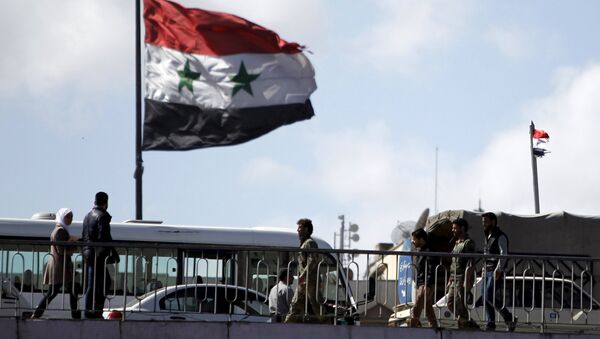MOSCOW (Sputnik) — Russian delegation head at Astana talks and Special Presidential Representative for Syria Alexander Lavrentyev said that the delegation had not managed to speak to the representatives of the armed Syrian opposition, even though there were topics for discussion.
"Unfortunately, we did not manage to speak to the armed opposition, even though we had issues to discuss from the point of view of the decisions which were taken at this meeting within the framework of reaching the memorandum on de-escalation zones," Lavrentyev told reporters.
Proposals
According to the text of the memorandum, the zone of de-escalation of tensions in Syria will be established in Daraa and Quneitra provinces.
"Guarantor states agreed to create de-escalation zones in Idlib province and parts of the neighboring provinces (Latakia, Hama and Aleppo), certain parts in the north of Homs province, Eastern Ghouta, certain parts in Syria's south (Daraa and Quneitra provinces)," the memorandum reads.
The warring parties in the Syrian conflict will not be able to use any weapons in the zones of de-escalation in Syria, as well as will not be able to conduct airstrikes.
"Within the borders of de-escalation zones military actions between the warring sides (the Syrian government and the formations of the armed opposition that have already joined or will join the ceasefire regime) stop, including the use of any weapons, including airstrikes," the text reads.
Russian delegation head at Astana talks and Special Presidential Representative for Syria Alexander Lavrentyev said that Russia was ready to send its observers to the safe zones in Syria and did not rule out other countries taking part in monitoring de-escalation.
"Russia is ready to take part in sending its observers to the so-called safe zones to take part in monitoring of the adherence to the cessation of hostilities, registering positive violations, but we as guarantor states agreed that participation of other countries is also possible but only on the basis of consensus [of the guarantors]," he told reporters.
Lavrentyev added that all the hostilities in the mentioned areas would cease by May 6.
Also, the memorandum envisages safe areas along the zones' borders to prevent direct fire between the warring sides.
"Along the borders of the de-escalation zones, it is envisaged to create safe areas to prevent incidents and direct clashes between the warring parties," the memorandum reads.
The working group of the Syrian ceasefire guarantor states within the framework of the project will complete the preparation of the necessary maps by June 4.
"The Guarantors shall take steps to complete by 4 June 2017 the preparation of the maps of the de-escalation areas and security zones," the memorandum reads.
Lavrentyev said the de-escalation zones in Syria would be a temporary measure which will be enforced for six months initially with possibility of extension.
"We agreed that the de-escalation zones will be established for a period of six months with the option of automatic extension for another six months unless there will not be some circumstances and the guarantor states will take the other decision. The memorandum can be indefinite if needed," he told reporters.
Reaction
UN Special Envoy for Syria Staffan de Mistura said that the memorandum on the establishment of four de-escalation zones in Syria is a right step in direction toward actual ceasefire in the country.
"This initiative is a step in right direction because it is pushing for concrete de-escalation in four zones," de Mistura told reporters.
According to the official, the United Nations is "strongly supportive" of the initiative.
"I will be consulting the SC [UN Security Council] and Syrian partners in light of this new development to set the date for next Geneva talks. I will not announce it now," he added.
Bashar Jaafari, the head of the Syrian government delegation to the Astana talks, also welcomed the signing of the memorandum, expressing hope for swift implementation.
"Syria supports the Russian initiative on de-escalation zones… Syria affirms continuation of the war against terrorism…. We wish that our Russian, Iranian friends will discuss details of implementation of this memorandum as soon as possible," Jaafari told reporters.
Iranian Deputy Foreign Minister Jaberi Ansari said the memorandum may lead to crucial changes in the country given its successful implementation.
"The document signed by the representatives of the ceasefire guarantor states, if properly implemented, could lead to fundamental changes in Syria," Ansari told reporters.
The deputy minister added that the memorandum should be implemented one month after signing.
"One month after signing of agreement it should be implemented, " Ansari told reporters, asked when the memorandum would be implemented.
Ansari noted that a number of other documents were still on the table, namely, on detainees and demining of Palmyra.
"Of course there is still a number of other documents on the table, like on detainees release and demining of Palmyra…. They have been discussed, but not finalized," Ansari said.
Next Round
Kazakh Foreign Minister Kairat Abdrakhmanov said that the next round of intra-Syrian talks in Astana would be held in mid-July, while two weeks before that an expert meeting would take place in Ankara.
"It was decided to hold the next high-level meeting in Astana in mid-July 2017, and preliminary expert consultations two weeks before in Ankara," Abdrakhmanov told reporters.
The first three rounds of talks on Syrian settlement brokered by Russia, Turkey and Iran, were held in Kazakh capital Astana on January 23-24, February 15-16 and March 14-15. During the talks, the participants agreed to set up a ceasefire monitoring group, among other issues.




